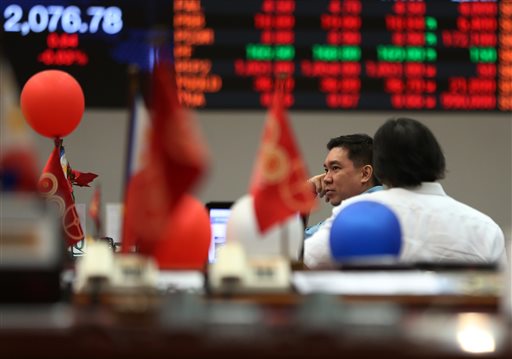
Filipino traders chat during a lull in trading at the Philippine Stock Exchange at the financial district of Makati on Monday, July 6, 2015. Asian shares tumbled Monday after Greece’s voters vehemently rejected conditions set by its international creditors, deepening doubts over their future in the 19-nation eurozone. The external headwinds faced by emerging markets such as the Philippines have intensified as the specter of a financial crisis closer to home in the wake of a stock market rout in China added to jitters surrounding debt-strapped Greece. AP PHOTO/AARON FAVILA
The external headwinds faced by emerging markets such as the Philippines have intensified as the specter of a financial crisis closer to home in the wake of a stock market rout in China added to jitters surrounding debt-strapped Greece.
“As Greece continues negotiations with creditors, likely into the weekend, markets are likely to increasingly price in bad news, while Chinese stocks have entered a vicious spiral that can be stopped only by direct large-scale purchases by government funds. Perhaps, surprisingly, the latter factor has resulted in more blood-letting, and in the coming days it has the potential to cause further damage,” Credit Agricole said.
It added that the upcoming release of the minutes of the US Federal Open Market Committee meeting was increasing the uncertainty regarding the US Fed’s rate policy, while plunging oil prices were weighing on the assets of commodity producers.
“We recommend investors largely stay on the sidelines until the dust settles,” it said.
“Investors could speculate that this market rout will slow down consumer spending and destabilize financial institutions in China. Spillover effects could be felt most in markets in Australia, Malaysia, Thailand and the other economies heavily dependent on exports to China,” said Emilio Neri Jr., economist at Bank of the Philippine Islands.
“Philippine markets will probably not be spared from volatility owing to our indirect trade and financial market linkages with China. When the dust settles, however, and data proves that China’s economy remains resilient, we could see our markets bouncing back immediately,” Neri said.
“It might be too early to start pushing the panic button. The fall has been just happening over the past couple of weeks so it really depends on the reaction of the China central bank,” said Jose Mari Lacson, head of research at Campos Lanuza & Co.
On the possible worst-case scenario, Lacson said that what was happening in China’s stock market was not affecting the Philippines directly. “Our direct exposure to China is not likely to be substantial. There are concerns that there could be some contagion effect, which is possible, but that will not be driven by the ongoing crash of China’s stock market. I think the crash is reflective of something more fundamental,” Lacson said.
He said one potential impact of the crash on the Philippines, however, would be through foreign direct investments (FDI). “If the fall of China’s stock market affects the balance sheet, liquidity and overall credit-worthiness of Chinese companies, particularly the multinationals, then we could see local partnerships with them to be at risk. This really depends on the balance strength of the Chinese companies and their subsidiaries that are invested here,” he explained.
A more realistic and direct impact is the fundamental reason behind the crash—an overcapacity in the Chinese economy, Lacson said. “Hopefully, the situation does not end up being a case of the US where the roaring 1920s eventually led to the Great Depression of the 1930s, with the Great Crash of the 1928-29 being symptoms of the economic overcapacity,” he said.
But if this leads to a major economic depression in China, Lacson said there would be several areas where the Philippines should be more worried about. Firstly, he said the country would be concerned about commodity prices such as copper and nickel, its two major exports to China, the biggest consumer of these metals. He noted that there had already been a sharp decline in commodity prices and those of mining stocks this week.
American investment bank Merrill Lynch BofA, in a research note, said the China market crash was a “loss of faith” in the Chinese government’s ability to manage asset prices reasonably smoothly. It warned that the ripple effect from the market correction has yet to show up—slower growth, poorer corporate earnings and a higher risk of a financial crisis.
“The net result of this volatile market is a transfer of wealth from the people on the street to the wealthy, including many major shareholders, who cashed out. We expect this will likely hurt consumption down the road. More critical is a potential distortion to credit flows due to the impairment to financial institutions’ balance sheets—as experience with Japanese banks shows, even if they don’t have to mark-to-market and book losses, their lending attitude may turn more cautious,” Merrill Lynch said.
If the Chinese market continues to fall sharply, Merrill Lynch said stock lending-related losses could run into trillions in renminbi, of which banks and brokers may have to bear a meaningful share.